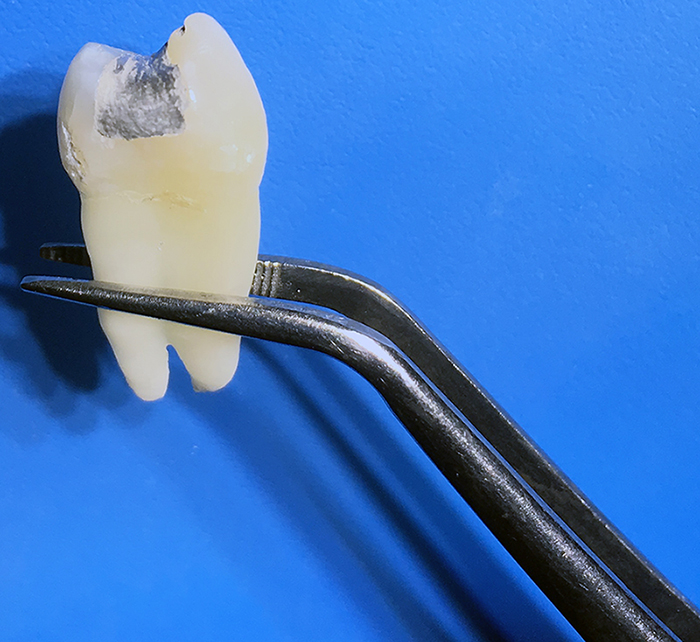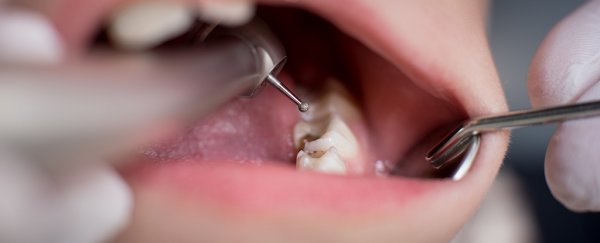The good news: we're getting new magnetic resonance imaging ( MRI) devices that are several steps more powerful and useful than our existing machines - meaning we'll get more detailed images of the body. The not-so-good news: these devices are so strong, they could cause the mercury in your tooth fillings to leak out.
The new-generation MRIs are rated at 7 tesla (or 7-T), where tesla is the unit of magnet strength. Current devices are rated at 1.5-T or 3-T, so you can see the jump in the intensity of the resulting magnetic field.
To test its effects on dental fillings, a team of researchers filled a collection of 60 loose teeth with dental amalgam, which is around 50 percent mercury.
After being put in a solution designed to mimic saliva, the teeth were processed through two different MRI scanners – one 1.5-T model and one 7-T model – to see how much of the mercury in the fillings leaked out to the surrounding liquid.
 One of the teeth used in the study. (Akdeniz University)
One of the teeth used in the study. (Akdeniz University)
"In our study, we found very high values of mercury after ultra-high-field MRI," says one of the team, dentist Selmi Yilmaz from Akdeniz University in Turkey.
"This is possibly caused by phase change in amalgam material or by formation of microcircuits, which leads to electrochemical corrosion, induced by the magnetic field."
Specifically, there were 0.67 parts-per-million of mercury content in the artificial saliva around the 20 teeth run through the 7-T machine.
That's around four times the level of mercury in the solution around the 20 teeth that went through the 1.5-T scanner, and the 20 teeth that weren't scanned and acted as a control group.
Previous research has also indicated these high-strength MRI machines could pose problems for certain types of fillings in some people.
Before you start panicking about your next trip to hospital though, one important question from a health perspective is how much of this mercury would go on to be absorbed by the body's vital tissues. That's something we still don't know.
It's actually the case that small amounts of mercury leak out of fillings anyway, as they settle in the tooth and as we chew our food. Despite what some people may believe, the scientific consensus is that this isn't a health risk.
The researchers say there's no need to be concerned if you're booked in for an MRI scan: most machines operate at 1.5-T, and 7-T versions are still very rare, having only just been approved for use – unless you're a medical researcher, you won't come across one yet.
That said, the study shows enough of a difference in mercury leakage that the team wants to investigate potential health implications further. Another three experiments are in the works to see exactly what the risks are.
Furthermore, this type of mercury-containing dental amalgam is already being phased out in favour of more environmentally friendly alternatives; it's not good for the food chain if it gets out into the environment.
According to Damien Walmsley from the University of Birmingham in the UK, who wasn't involved in the study, we need to keep a close eye on further research – but there's no need to cancel your next MRI appointment.
"This will be a decreasing problem in time [as amalgam fillings are phased out] but the development of new ultra-high-strength MRI scanners, which were only approved by the US Food and Drug Administration last year, needs to be reviewed closely," Walmsley told the BBC.
"The study indicates that people who have amalgam fillings should not be concerned if they need to have a conventional MRI scan."
The research has been published in Radiology.
